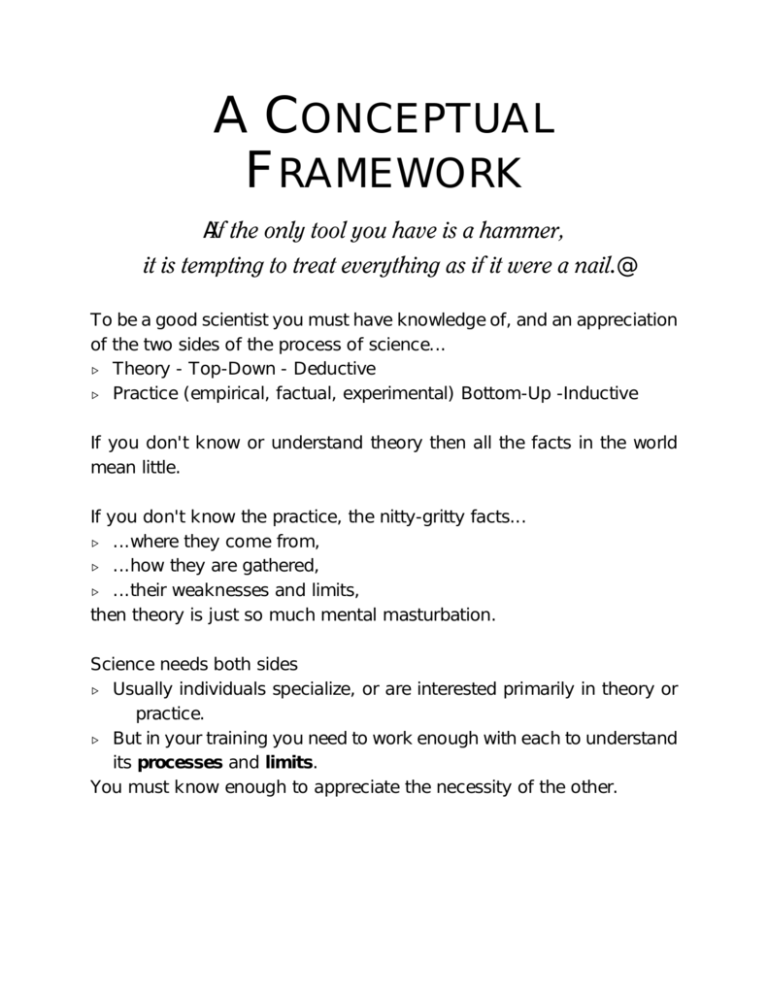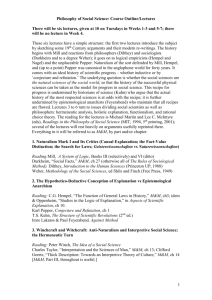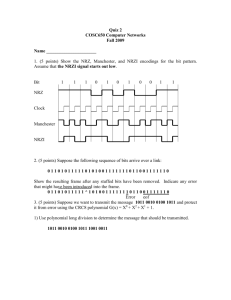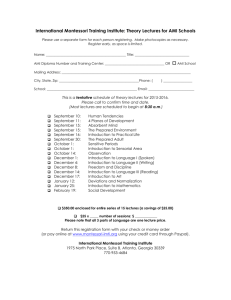Philosophical Foundations
advertisement

A CONCEPTUAL FRAMEWORK AIf the only tool you have is a hammer, it is tempting to treat everything as if it were a nail.@ To be a good scientist you must have knowledge of, and an appreciation of the two sides of the process of science... Í Theory - Top-Down - Deductive Í Practice (empirical, factual, experimental) Bottom-Up -Inductive If you don't know or understand theory then all the facts in the world mean little. If you don't know the practice, the nitty-gritty facts... Í ...where they come from, Í ...how they are gathered, Í ...their weaknesses and limits, then theory is just so much mental masturbation. Science needs both sides Í Usually individuals specialize, or are interested primarily in theory or practice. Í But in your training you need to work enough with each to understand its processes and limits. You must know enough to appreciate the necessity of the other. WP\LSF\364\LECTURES\CONCEPT.FRM APHILOSOPHICAL FRAMEWORK - 2 If you emphasize the practical, the experimental side, you must know enough theory to understand... Í Why you are running your experiments " Indeed, which experiments to run. You must also be aware of new trends in ideas, and when old ideas are becoming passe. If you emphasize theory, you must know enough about experiment to know... Í How to test the theory, or to explain how it can be tested. Í You must know the limits of experiment and the nitty-gritty. Í And you must know what the definitive experiment is... " ...and when a pet theory must be revised, or thrown out. This course is designed to explore one area of geologic research... Í sedimentary/stratigraphic geology The lecture concentrates on theory. The lab is to give you experience at empiricism, the nitty-gritty that determines whether a theory rises or falls It is not easy doing geology at the nitty-gritty. You tend to become so overwhelmed by detail and fact that you lose all contact with theory. Í In fact, at first, on the outcrop it seems like you have forgotten anything you ever knew about theory, and have to start over. Í You have to relate this rock which is immediately in front of you to rocks at other places, and build in you mind a conceptual framework (theory) of how they are related. " OR, you have to struggle to re-see the theory again in something other than the privacy of your mind. WP\LSF\364\LECTURES\CONCEPT.FRM APHILOSOPHICAL FRAMEWORK - 3 The hardest thing you will have to learn this semester is to go back and forth readily from fact to theory, and theory to fact. Í It will not be easy, and it will not come passively. Í You will have to work at, and struggle with it. Í You will become frustrated, and if you don't you are not working hard enough. Í And if you do not become frustrated, you will probably not make the transition because what you are trying to achieve is a new stratified stability. WP\LSF\364\LECTURES\CONCEPT.FRM APHILOSOPHICAL FRAMEWORK - 4 A PHILOSOPHICAL FRAMEWORK Must of what we need to understand today is philosophical. L Some is review of things covered in Geology 230 . . . but a review probably would not hurt. Presumably what we are after when we do science is TRUTH L The real description of how the world is . . . > . . . And works, > . . . And why. L After all, that is what science is supposed to do. L But that is also what religion claims to provide, as well as the hundreds of philosophies that exist. But Truth is tricky, because not everyone agrees on what is true. L Therefore we must try to come to grips with the truth we seek. WP\LSF\364\LECTURES\CONCEPT.FRM APHILOSOPHICAL FRAMEWORK - 5 Kinds of Truth Mythical Truth - It is so because it is said to be so Analytical Truth - 2 + 2 = 4 Empirical Truth - It is raining. The doorbell is ringing Scientific Truth Mythical Truth The academic study of mythology has been going on for about a century. " James Frazier, The Golden Bough " Joseph Campbell, The Hero With a Thousand Faces " Mircea Eliade, The Sacred and the Profane, Myth and Reality We are interested in mythology in the sense that these people use it. QUESTION: What does the word myth mean to you? If someone says, "That's a myth" what is the first things which come into your mind? 4. Any fictitious or imaginary story, explanation, person or thing" (American Heritage Dictionary) This is the way most people would define a myth, but note that it is the 4th definition. 1. A traditional story originating in a preliterate society, dealing with supernatural beings, ancestors, or heroes that serve as primordial types in a primitive view of the world." WP\LSF\364\LECTURES\CONCEPT.FRM APHILOSOPHICAL FRAMEWORK - 6 This definition still implies a myth is an untrue story. We are not using myth in either of these ways. Í We are using myth in the sense that d'Aquili and Eliade use it, and the way any believer of a myth understands it. A myth is a true story which relates the origin of things. Mythology is the first human attempt to find explanations for the unexplained. Eliade and Mythology in the Sacred and the Profane < Mircea Eliade explains myths in terms of human history and behavior. "For religious man, nature is never only "natural"; it is always fraught with religions value. This is easy to understand, for the cosmos is a divine creation; coming from the hands of the gods, the world is impregnated with sacredness." (p 116) "The myth relates a sacred history, that is, a primordial event that took place at the beginning of time, ab initio. But to relate a sacred history is equivalent to revealing a mystery. For the persons of the myth are not human beings; they are gods or cultural heros, and for this reason their gesta constitutes mysteries; man could not know their acts if they WP\LSF\364\LECTURES\CONCEPT.FRM APHILOSOPHICAL FRAMEWORK - 7 were not revealed to him. The myth, then, is the history of what took place in illo tempore, the recital of what the gods or the semidivine beings did at the beginning of time. To tell a myth is to proclaim what happened ab origine. Once told, that is, revealed, the myth become apodictic truth; it establishes a truth that is absolute. (page 95). < So far, so good. < But how do we know their myth is true? "It is so because it is said to be so," the Netsilik Eskimos declares to justify the validity of their sacred history and religious traditions. (page 95) But we may be tempted to be skeptical of mythical truths, and desire a more universal “truthful truth”. APHILOSOPHICAL FRAMEWORK - WP\LSF\364\LECTURES\CONCEPT.FRM 8 Empirical and Analytical Truth 2. EMPIRICAL TRUTH. "It is raining." "The doorbell is ringing." L "Empirical truth attaches to statements that are in agreement, directly or indirectly, with observations." (page 63) 3. ANALYTICAL TRUTH. "Validity can be decided only by analyzing their contents; their truth resides within themselves." ± 2+2=4 ± all mathematical theorems The formal development of the other kinds of truth did not begin until the height of the Greek civilization in the 2-3 centuries B.C. Prior to this time the Greek religious thinking was still dominated by mythology, and the religious forms which sprang from mythology. But by the 3rd and 2nd centuries B.C. we begin to see a close examination of human knowledge (EPISTEMOLOGY), and of what humans can know. L All three kinds of truth beyond mythical began at this time. Empirical and Analytical truth is most closely identified with Greece's two most famous philosophers, Plato and Aristotle. L Aristotle was a student of Plato's, but ironically came to opposite conclusions about the essential nature of reality from his mentor. L Thus these two Greek philosophers have come to symbolize the opposite views about reality and ways of thinking about it. Plato = Analytical = Deductive Logic (dialectic) Aristotle = Empirical = Inductive Logic (plus syllogistic deduction) WP\LSF\364\LECTURES\CONCEPT.FRM APHILOSOPHICAL FRAMEWORK - 9 Plato and the Dialectic Plato's method was the DIALECTIC, a form of deductive logic DEDUCTION - The process of reasoning in which a conclusion follows necessarily from a stated premise; inference by reasoning from the general to the specific. L Or, arguing from first principles accepted as True through systematic steps to other Truths, that because they are logically derived from the premises are equally true DIALECTIC - the art or practice of examining statements logically, as by question and answer, to establish validity. L For example, the Socratic dialogues ± There exist ideals (Truths). Because these Truths are part of the universe all humans are born knowing at some deep level these Truths. ± The object of education was not to induce unknown knowledge, but to allow individuals to discover the Truths for themselves via the dialectic L For example, mathematical reasoning - shepard boy story L For example, the allegory of the cave WP\LSF\364\LECTURES\CONCEPT.FRM APHILOSOPHICAL FRAMEWORK -10 Aristotle's Epistemological Method Aristotle is well known as the inventor of the SYLLOGISM - another form of deductive argument ± SYLLOGISM - a three part (1) Major premiss (2) Minor premiss (3) Conclusion ± See OVERHEAD (Deductive) argument. All men are mortal 1 All heros are men Therefore all heros are mortal Yet. . ."(Aristotle) repeatedly admitted the importance of induction, and he devoted considerable attention to the question: how do we know the first premisses from which deduction must start?" [Russell, 199] Unlike Plato, Aristotle did not wish to make an end run around nature to get to the ideal: "For though there are animals which have no attractiveness for the senses, yet for the eye of science, for the student who is naturally of a philosophic spirit and can discern the causes of things, Nature which fashioned them provides joys which cannot be measured." [Harris 36] Aristotle's interests included physics, logic, meteorology, metaphysics, the soul, memory, dreams, politics, rhetoric, drama, and various aspects of biology. Thus we get the term Aristotelian... ARISTOTELIAN A person who tends to be empirical or scientific in his methods or thought. L Aristotle argued that only what we experience with our senses is true. L We take our individual senses and combine them to form concepts. L This is INDUCTIVE 1 LOGIC This is Aristotle's own example; excuse the sexism. WP\LSF\364\LECTURES\CONCEPT.FRM INDUCTION APHILOSOPHICAL FRAMEWORK -11 A principle of reasoning to a conclusion about all the members of a class from examination of only a few members of the class; broadly reasoning from the particular to the general. L Taking many experiences and combining them into a concept WP\LSF\364\LECTURES\CONCEPT.FRM APHILOSOPHICAL FRAMEWORK -12 DESTRUCTION OF CONFIDENCE THE SEARCH FOR TRUTH Humans have been seeking the Truth for a long time, and through many different strategies. L Mythical L Mystical L Searching deep within the self L Deductive logic L Inductive logic The trouble with all these is that they are all basically flawed in some way. L That is, the Truths that they claim to have found are not perceived by everyone to be Truths. But from St. Thomas Aquinas on, the Truths that were thought to be the most reliable were: L Analytical ± Deduction (mathematics) ± Newton L Empirical ± Induction ± Francis Bacon Both of these in the 17th to the 20th centuries became fundamental to science. L Indeed, since Francis Bacon science has been commonly described as the "Inductive Method" L X is a Y Therefore, all X's are Y's WP\LSF\364\LECTURES\CONCEPT.FRM APHILOSOPHICAL FRAMEWORK -13 And since Thomas Aquinas deduction has been also been integral to logical thinking and science in the west. The trouble is, both of these methods of discovering Truths are fundamentally flawed L The development of science as we know it today has required grappling with these flaws DEDUCTIVE (SYLLOGISTIC) FLAWS The flaws in deduction are the easiest to deal with, and have been dealt with by philosophers L Validity vs. Truth INDUCTIVE FLAWS The flaws of induction were most clearly dissected by David Hume WP\LSF\364\LECTURES\CONCEPT.FRM APHILOSOPHICAL FRAMEWORK -14 David Hume 1711-1776 TREATISE ON HUMAN UNDERSTANDING "Hume showed that induction from particular observations is theoretically incapable of establishing...[generalizations which are true] [Burke, Philosophy of Popper, p 22] Hume saw two defects with Induction, one logical, the other psychological. LOGICAL Defect "Hume points out that induction involves a logically invalid argument from some to all..." [Burke, 43] +)) * X is a Y * Therefore, All X's are Y's .)) +)) * All the crows I have seen are black. * Therefore, all crows are black. .)) PSYCHOLOGICAL DEFECT Hume also pointed out that knowledge involving what we believe are causal relation is uncertain and at best only probably. [Siu, 28] A causes B WP\LSF\364\LECTURES\CONCEPT.FRM APHILOSOPHICAL FRAMEWORK -15 ± Can only come from sense experience. ± This is not a logical relation; it only means A and B are found conjoined, i.e. A has been observed to immediately or very quickly be follow by B. ± You cannot convert this to B must follow A. ± It is a sequential derivation which does not guarantee same conjunction in the future ± "Hume repeats many times the contention that what appears to us as necessary connection among objects is really only connection among the ideas of those objects: the mind is determined by custom, and ''tis this impression, or determination, which affords me the idea of necessity.' The repetition of instances, which leads us to the belief that A causes B, gives nothing new in the object, but in the mind leads to an association of ideas; thus 'necessity is something that exists in the mind, not in the objects.' [Russell, 666] In other words... L Just because you see it over and over again does not mean more pieces of evidence, it is the same evidence repeated ± Our desire to see a connection is just that, our desire. The world is not obliged to correspond to or confirm our need (our cognitive imperative). The psychological flaw in induction science is that it assumes sensorybased experience is "real" and that it applies to all cases everywhere. "If we argue inductively, our premises, even if impeccably true, are logically insufficient to show that our conclusion is true, or even probably, and that is that." [Burke, 43] WP\LSF\364\LECTURES\CONCEPT.FRM SO, a LAW APHILOSOPHICAL FRAMEWORK -16 - is not something inherent in the logic and structure of the Universe ± A LAW is a generalization we make to satisfy our Cognitive Imperative based on the repeated appearance of an association of A and B. ± To DISCOVER means only that we have seen the juxtaposition of A and B and have said so. WP\LSF\364\LECTURES\CONCEPT.FRM APHILOSOPHICAL FRAMEWORK -17 Karl Popper THE LOGIC OF SCIENTIFIC DISCOVERY, 1959 CONJECTURES AND REFUTATIONS, 1963 Science is the search for Truths more universal than myths, and more reliable than magic > Bacon thought he had it with Induction > But Hume demonstrated that false > Most ignored Hume, especially science, because there seemed to be no solution > In this century Karl Popper provides a solution, but it turns the common conception of science on its head > For this reason Karl Popper is one of the giant philosophers of science in this century. When he came on the scene in the early part of this century science was a very sloppy, haphazard affair... ± and still largely INDUCTIVE SO Popper asked the following question...` ± "When should a theory be ranked as scientific?" OR "Is there a criterion for the scientific character or status of a theory." Popper DID NOT ask the following questions... ± When is a theory true? nor When is a theory acceptable? WP\LSF\364\LECTURES\CONCEPT.FRM APHILOSOPHICAL FRAMEWORK -18 Popper wanted to distinguish between science and pseudoscience ± The assumption at the time was that science could be distinguished from pseudoscience by its empirical method which is essentially inductive, proceeding from observation to experiment. THE LOGIC OF SCIENTIFIC DISCOVERY, 1959 Here Popper resurrects Hume's criticism of Induction ± "Induction, i.e. inference based on many observations, is a myth. It is neither a psychological fact, nor a fact of ordinary life, nor one of scientific procedure." [Burke, 43] ± Popper argues that THERE IS NO SUCH THING AS AN UNBIASED OBSERVATION. It is psychologically and logically impossible. 2 OR, You can only see what you are looking for, and you can't see what you aren't looking for. CONJECTURES AND REFUTATIONS, 1963 Theories must make predictions which says. "If this prediction is wrong then my theory is wrong." ± The only way we can know if a concept is "right" is to "test" it. ± "What is essential to the development of science (and our everyday knowledge of the world as well) is the discovery, not of many observational data which support a given hypothesis, but of one which refutes it." [Burke, 50] 2 "What is misleading is the belief that facts exist prior to, and independently of, the theories we hold." Instead, as we look more closely at facts, we realize that they are inextricably entangled with theories and misconceptions. For example, it is natural to believe what we see; it is hard to imagine doing anything else. But the eye can be fooled. WP\LSF\364\LECTURES\CONCEPT.FRM APHILOSOPHICAL FRAMEWORK -19 ± A theory which is not refutable by any conceivable event is nonscientific. Irrefutability is not a virtue of theory (as people often think) but a vice. [Popper, 22] ± Every genuine test of a theory is an attempt to falsify it, or to refute it. [Popper, 22] The purpose of science is not VERIFICATION but FALSIFICATION APHILOSOPHICAL FRAMEWORK -20 WP\LSF\364\LECTURES\CONCEPT.FRM Jacob Bronowski and the The "To and Fro" Model The clearest description of modern science that I have encountered of modern science comes from Jacob Bronowski L In Science and Human Values he provides a description of science that is the clearest we can find L Demonstrates how induction and deduction are pitted against each other so that the flaws of one are countered by the strengths of the other. Exploration of Model Note the following: L Facts do not exist in isolation: ¸ “There are I hold no atomic facts . . . “ ¸ “Systems of classification are not hatracks objectively presented to us by nature, they are dynamic theories developed to express particular views” L There is a polarity here. ( Theories ¸ Facts ( Observations ¸ Interpretations (not vice versa) (not vice versa) Not this: “Because this is a shelf environment this must be a hummocky sequence.” ( You must learn to recognize and distinguish between these instinctively. WP\LSF\364\LECTURES\CONCEPT.FRM APHILOSOPHICAL FRAMEWORK -21 Guiding Principles In the Search for Scientific Theories Scientific Truth, as you will recall, is one which combines, or makes use of two simpler kinds of truth L Empirical Truth - what can be demonstrated directly with the senses. L Analytic Truth - truth which exists with the logical structure of the system. Through centuries of struggles to understand when something is analytically true..., L ...and to avoid the pitfalls of weaknesses in human imagination, scientists and philosophers have defined a series of criteria by which a hypothesis or theory are to be judged scientific. L There are as many as seven guiding principles, probably more. ] Sometimes one guiding principle has several different names given by different authors. ] Sometimes authors combine or partially combine different ones of these. L And there exits a large literature on each of them, exploring exactly what they mean and what their limits are. < We are going to examine only some of them. To be scientific a hypothesis must possess or exhibit each and all of the following: WP\LSF\364\LECTURES\CONCEPT.FRM APHILOSOPHICAL FRAMEWORK -22 1. EXPLAINABILITY OR CAUSALITY - The empirical observations must all be explained by processes which lie within the realm of analytic truth. - OR, no magic, no supernatural intervention, no miracles, nothing that lies beyond the known and analytically demonstrated laws of nature. 2. EXTENSIBILITY - A theory which has extensible is one which demonstrates its ability to explain ever more (empirical) observations, or which demonstrates an ability to show how ever more observations are logically connected. - Frequently this principle is used to choose between two theories, typically an older theory being challenged by a newer one. ! Based on older knowledge and understanding a theory is proposed, but with more knowledge and understanding a new theory surfaces which not only explains the new observations but also demonstrates how these are related to the things explained by the older theory, while the older theory cannot explain the new observations. ! The new theory is more "extensible", that is, it extends to more observations. 3. LOGICAL FERTILITY - A scientific theory must have logical - and ultimately empirical consequences. APHILOSOPHICAL FRAMEWORK -23 WP\LSF\364\LECTURES\CONCEPT.FRM - THAT IS, the theory must make predictions about things we don't yet know, or have not yet observed. 4. FALSIFIABILITY OR TESTABILITY - The theory must be TESTABLE, that is, it must say, "Based on everything we know the following should also be true. If it is the theory is strengthened (because it has demonstrated extensibility), but if the prediction turns out to be false then the theory is also false and must be abandoned and replaced by another." - FURTHERMORE, it is imperative that the theory be vulnerable to these tests, i.e. can be FALSIFIED or demonstrated not true. ! IF the prediction turns out to be not true, not observable, the theory needs to be abandoned. 5. SIMPLICITY - OCCUM'S RAZOR - Simplicity is not a simple concept, and much has been written on exactly what is meant by simplicity. - Interestingly, this guiding principle had its origins in theology in the late Medieval period. ! At this time very convoluted theological arguments were being made ! William of Occum tried to cut through all this with the principle: "Essential non stunt multiplicanda praeter necessitatem" "One must not proliferate constructs beyond necessity" - OR, the hypothesis which explains the most with the least number of assumptions is to be preferred.







